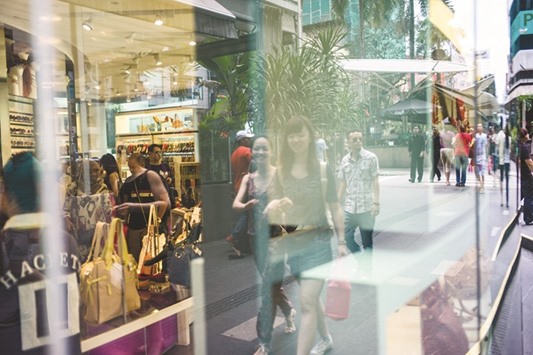Under the hood of Malaysia’s stock market, the worst performer in Southeast Asia this year, a record consumer rally is percolating.
While falling oil prices and a scandal engulfing an embattled state investment firm have sent the benchmark equities gauge to near a one-year low relative to the MSCI All Country World Index, the Bursa Malaysia Consumer Product Index touched an all-time high last month. The gauge is up about 10% from a seven-month low reached in August 2015 on bets of a revival in spending, according to Affin Hwang Capital Asset Management Bhd.
“We foresee a gradual recovery for domestic consumption in the second half of 2016,” said David Ng, chief investment officer of Kuala Lumpur-based Affin Hwang Capital, which manages $7.7bn of assets. “We believe sentiment will improve” after consumption last year was hurt by a goods and services tax and the plunge in the ringgit, he said.
Faced with an economy that’s projected to grow at the slowest pace in seven years amid weaker exports, the government took steps to spur consumer spending to put more cash in the hands of the nation’s 32mn people. Prime Minister Najib Razak raised the nation’s minimum wage, increased salaries for 1.6mn civil servants and cut compulsory worker contribution rates to the national pension fund. The nation’s central bank in July lowered interest rates for the first time in seven years.
The MIER Malaysia Consumer Sentiments Index rose for a second quarter in the three months ended June, diverging further from the longest slump in the main gauge since 1998, while passenger car sales jumped 32% in June, the most in 15 months.
Money-supply indicators have shown upward trends starting in late April, following a six-year downcycle, said Michael Greenall, an analyst at Kuala Lumpur-based CIMB Group Holdings. If the current uptick continues, it would be a positive sign for the equity market, he said in a July note.
Clothing retailer Padini Holdings, which in May reported a 32% surge in quarterly profit, has rallied 43% this year to a record. Heineken Malaysia, whose earnings jumped 38%, is trading at levels not seen since 2013, while Nestle’s (Malaysia) stock price has never been this high in its almost 30-year existence as a listed company.
Danny Wong Teck Meng, whose Areca EquityTrust Fund beat 97% of peers over the past five years with a 10% annual return, said he has turned more aggressive in buying consumer shares poised for a recovery in earnings. “We have been buying selectively,” said Wong, chief executive officer of Areca Capital, based in Petaling Jaya, outside Kuala Lumpur. “Consumer sentiment is pointing to an uptick; if the worst is not over, it would be near the bottom.”
The Bursa Malaysia Consumer Product Index is up 3.1% this year, one of only three industry groups - the other are builders and finance companies - that have shown positive gains in Malaysia’s stock market. The consumer gauge climbed less than 0.1% at the close on Tuesday, while the FTSE Bursa Malaysia KLCI Index slid 0.3%.
Not everyone is buying. International investors are attracted to higher growth markets in the region, said Alan Richardson, a Hong Kong-based fund manager at Samsung Asset Management.
“As a stock picker I find it challenging to find growth stocks and in the hunt for yield, I can find higher dividend- paying stocks in Singapore over Malaysia,” said Richardson, whose fund has returned 11% over past five years, outperforming 97% of its peers. “Essentially the key investing attributes I am looking for, I can find better alternatives in other Asean stock markets.”
The FTSE Bursa Malaysia KLCI gauge is down 1.9% this year, while equity benchmark measures in Thailand, Indonesia and the Philippines have rallied at least 16%.
Last month, US prosecutors moved to seize $1bn in assets they say were stolen from 1Malaysia Development Berhad, or 1MDB, whose advisory board Prime Minister Najib Razak chaired until recently. Najib has denied any wrongdoing. The Monetary Authority of Singapore also said it seized S$240mn in assets from individuals linked to alleged fraud at 1MDB. It’s the latest chapter in the troubled company’s woes that contributed to the ringgit’s biggest annual drop since 1997 last year.
Lim Tze Cheng, head of equity at Kuala Lumpur-based RHB Asset Management Sdn., whose RHB Smart Treasure Fund returned 13% in the past three years to beat 95% of its competitors, said the uncertain global outlook has also attracted investors to consumer stocks especially staples, which are defensive in nature.
For Areca’s Wong, even as second-quarter corporate earnings may still disappoint investors, he is already buying for the recovery.
“The worst is nearing an end,” he said. “People are still generating income, and consumption from the middle class would drive this recovery,” he said.

Pedestrians are reflected in the window of a Vincci store, a unit of Padini Holdings in Kuala Lumpur. Padini, which in May reported a 32% surge in quarterly profit, has rallied 43% this year to a record.
